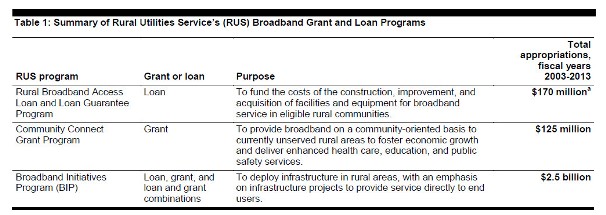 The U.S. Government Accountability Office has asked the Department of Agriculture, which oversees the Rural Utilities Service, to provide more detailed information about the impact of the broadband stimulus program in annual reports.
The U.S. Government Accountability Office has asked the Department of Agriculture, which oversees the Rural Utilities Service, to provide more detailed information about the impact of the broadband stimulus program in annual reports.
“RUS has not shown how the approximately $3 billion in funds awarded [for broadband infrastructure] BIP projects [has] affected broadband availability,” wrote the GAO in a 25-plus page report sent to members of Congress this month.
The authors also note that “without this information future efforts to expand broadband may lack important information on the types of projects that were most effective at meeting subscribership goals, thereby limiting the ability to apply federal resources to programs with the best likelihood of success.”
Network operators that applied for broadband stimulus funding were required to indicate how many locations they expected to reach with the networks for which they received funding. But as stimulus-funded networks are built, the RUS is not tracking the number of locations reached or the number of customers who have signed up for service.
According to the report authors, the USDA has said it will institute procedures to comply with the GAO’s reporting recommendations.
Broadband Stimulus Results
The RUS was one of two agencies — along with the National Telecommunications and Information Administration — that administered the broadband stimulus program. According to the GAO, the $2.5 billion in broadband stimulus funding that the RUS administered was eight times the amount that the RUS administered through traditional rural broadband grant and loan programs over a 10-year period.

The GAO report also contains some other interesting information about the broadband stimulus BIP program:
- As of March 2014, approximately 14% (42 of 297) BIP projects were terminated for a variety of reasons. Of the 255 projects remaining, 87% were in service, including 39 that were fully completed and 184 that were partially operational.
- The RUS did not allow stimulus recipients to change service areas but approved some other types of changes such as changes in technology.
- Some funding recipients encountered a range of delays, including a fiber shortage and long environment approval times. Accordingly the RUS changed project completion deadlines from 2013 to 2015. Nevertheless the agency expects to see some projects that have not been completed by the deadline and is developing policies and potential actions to deal with funding recipients for those projects.
- RUS staffers overseeing broadband stimulus program progress have a large workload that is challenging to handle, particularly considering that the agency’s travel funds have been reduced.

